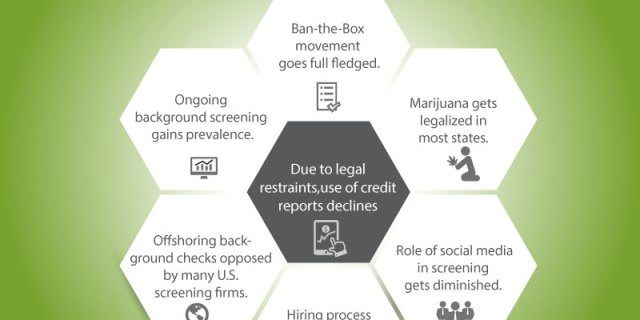7 Trends That Will Govern Screening Industry in 2015
As we bid adieu to 2014, we are on the verge of witnessing noticeable shift in the way background screening is perceived by employers. With a strong tailwind from a multitude of factors and convoluting compliance issues there is an increasingly high concern for workplace safety, uprising bad hiring costs – background screening is set for a strong start in 2015. This report covers a host of critical pre-employment screening issues that are expected have a substantial impact on the U.S. employers and job market. This report gives a heads-up on the emerging do’s and don’ts of running background checks on job applicants.
- Ban-the-Box Movement Goes Full Fledged – It seems the U.S. government has finally started buying the idea of preventing employers from inquiring about candidates’ prior criminal history. In 2014, Ban-the-Box legislation was passed in thirteen states and some local jurisdictions as well. This January Ban-the-Box will become effective in one more state, Illinois. Till now these laws primarily pertained to public sector employers. However with the advent of 2015, private sector employers will have to ensure compliance with them as well.
- Marijuana Gets Legalized in Most States – More and more states in the U.S. are decriminalizing the use and possession of marijuana. The question is what will be the implications of marijuana legalization in the workplace safety. The experts suggest, even if marijuana’s recreational use is legalized in the state the employer can still implement a zero-tolerance drug policy at the workplace in accordance with federal law. With marijuana legalization spreading like a wild fire in the U.S., it surely is a heads-up for employers to update workplace drug policies.
- Role of Social Media in Screening Gets Diminished – With social media becoming ubiquitous, employers started leveraging it for screening potential employees. In 2013, 2 of 5 employers used social media to pre-screen candidates according to Mediabistro. In response, the government intervened and introduced privacy laws in 2014 prohibiting employers from using candidates’ social profile. As of now, using social media for screening purposes invites potential discrimination and negligent hiring charges. However, social network searches continue gaining ground as a tool for recruiting, sourcing and employer branding.
- Hiring Process Becoming Integrated and Streamlined with ATS – Applicant tracking system (ATS) is becoming an essential and integral part of the hiring process. ATS automates and streamlines the talent lifecycle right from sourcing to background checks, from hiring to on boarding. In 2015, ATS will emerge as an indispensable web-based tool to help the employers maintain the compliance requirements to make informed, error-free hiring decisions.
- Offshoring Background Checks Opposed by Many U.S. Screening Firms Beginning in 2013, U.S. employers resisted offshoring Personally Identifiable Information (PII) of U.S. based applicants overseas, but recently it has gained momentum. With increasing pressure, the government might intervene in the process and take substantial steps to check corporations that continue to offshore background checks to minimize costs.
- Ongoing Background Screening Gains Prevalence – Practicing due diligence in workplace safety, most employers screen potential employees prior to offering the job. But there are very few employers who re-screen the current employees at periodic intervals. The need for ongoing background screening begins with a simple question – What’s the best way to mitigate the risks posed by current employees at the workplace? Ongoing background screening is fast and emerging as a crucial answer to this question. With yearly reviews, interval background checks can affirm or deny the right person for the position.
- Due to Legal Restraints, Use of Credit Reports Declines – Over the last year, the government as well as EEOC implemented significant restraints on the use of consumer credit reports in background checks. In 2015, the use of credit reports in screening will be subjected to strict scrutiny. The employers have to be more prudent of the state laws while exercising credit report checks on potential candidates. In 2015, the use of credit reports might decline further. In some states, credit report check is expected to go totally redundant due to the newly enforced guidelines.
Conclusion
Screeners as Partners, Not Providers
Both EEOC and FCRA are set to introduce new updates in the rules and regulations governing the preparation, dissemination, and use of criminal record screening reports for employment purposes. With screening laws and regulations becoming more complex and stringent than ever, consistent compliance will pose issues, pushing employers to re-evaluate the method of screening agencies to get their potential candidates screened. Even in 2014, employers and screening agencies that failed to follow FCRA compliance were slapped with hefty lawsuits.
As a result, in 2015 and beyond, the concern to be legally compliant with the screening laws will precede the actual screening services. Screening will become an integral and indispensable part of the hiring, making the employers choose their screeners as partners, rather than service providers.
